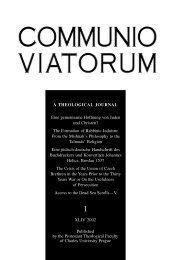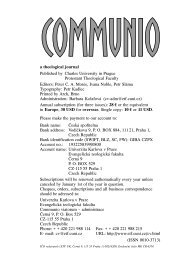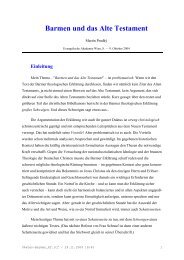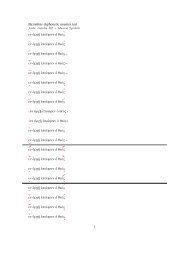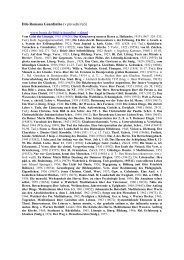A THEOLOGICAL JOURNAL XLIV 2002 Published by the Protestant ...
A THEOLOGICAL JOURNAL XLIV 2002 Published by the Protestant ...
A THEOLOGICAL JOURNAL XLIV 2002 Published by the Protestant ...
Create successful ePaper yourself
Turn your PDF publications into a flip-book with our unique Google optimized e-Paper software.
TONY CARROLL SJ<br />
gious power, <strong>by</strong> contrast, at least in <strong>the</strong> mono<strong>the</strong>istic traditions, is<br />
based on <strong>the</strong> power of God and issues in <strong>the</strong> subjection of <strong>the</strong> will of<br />
<strong>the</strong> individual to <strong>the</strong> will of <strong>the</strong> higher being known as God.<br />
Problems with <strong>the</strong> <strong>the</strong>ory of secularisation<br />
This <strong>the</strong>ory of secularisation is, so to speak, a cultural a priori with<br />
which we operate when we think about <strong>the</strong> modern world. At least,<br />
this was <strong>the</strong> case until recently. JosÈ Casanova in his book, Public<br />
Religions in <strong>the</strong> Modern World, explains how this has changed in<br />
<strong>the</strong> 1980ís and that now sociologists of religion seem to be as dismissive<br />
of <strong>the</strong> <strong>the</strong>ory as <strong>the</strong>y were initially faithful to it. 4 There are<br />
several reasons for this shift and here I†will simply outline two. The<br />
first cause can be attributed to what we might call <strong>the</strong> end of modernity<br />
<strong>the</strong>sis. The argument here runs as follows. The project of modernity<br />
was amongst o<strong>the</strong>r things <strong>the</strong> search to shake off <strong>the</strong> domination<br />
of <strong>the</strong> church and religious authorities from peoplesí lives. Kantís<br />
call, ìto have <strong>the</strong> courage to think for oneselfî, is formulated specifically<br />
in this context. Thus, one of <strong>the</strong> main aspects of <strong>the</strong> liberation<br />
sought for in this project was precisely what <strong>the</strong> <strong>the</strong>ory of secularisation<br />
proclaims, namely, <strong>the</strong> autonomy of <strong>the</strong> subject to use his<br />
or her reason for <strong>the</strong>mselves according to general principles which<br />
any reasonable person of whatever religious persuasion can admit to.<br />
This, in short, was <strong>the</strong> basic reading of <strong>the</strong> Enlightenment that we<br />
find in Kantís celebrated essay, ÑWas ist Aufkl‰rungì. However, with<br />
<strong>the</strong> calling into question of <strong>the</strong> normative basis of this initial project<br />
Locke are both <strong>the</strong>ories of secular sovereignty based on different conceptions of <strong>the</strong><br />
subjugation of <strong>the</strong> will of <strong>the</strong> citizen to a sovereign. The Republican tradition understands<br />
<strong>the</strong> subjection of <strong>the</strong> individual human will to <strong>the</strong> general will as <strong>the</strong> basis of<br />
sovereignty. In this tradition everyone is considered to own power since <strong>the</strong>y all play<br />
a part in constituting <strong>the</strong> general will. The Liberal tradition understands <strong>the</strong> subjection<br />
of <strong>the</strong> individual human will to <strong>the</strong> will of a sovereign as <strong>the</strong> legitimate basis of<br />
sovereignty. Both are thus secular <strong>the</strong>ories of subjection which constitute <strong>the</strong> legitimacy<br />
of political power. Here <strong>the</strong> sovereign owns <strong>the</strong> political power and simply<br />
claims legitimacy for this ownership from <strong>the</strong> allegiance of his subjects.<br />
4 JosÈ Casanova, Public Religions in <strong>the</strong> Modern World, Chicago, The University<br />
of Chicago Press, 1994, pp. 11ñ39.<br />
252



